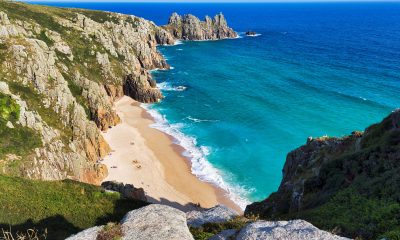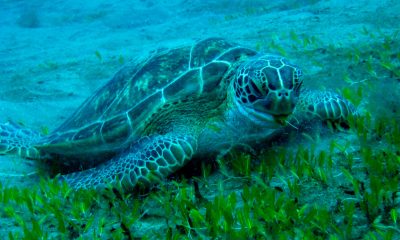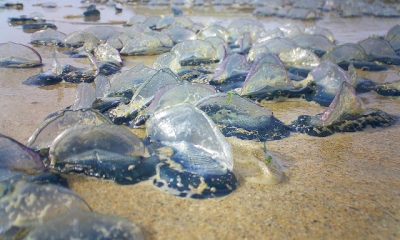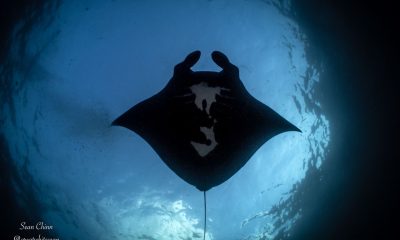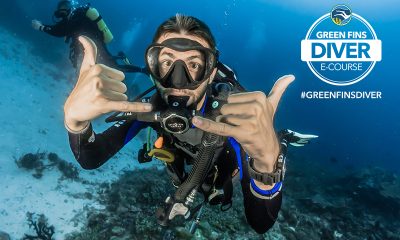Marine Life & Conservation
Turtle strandings on the rise this winter
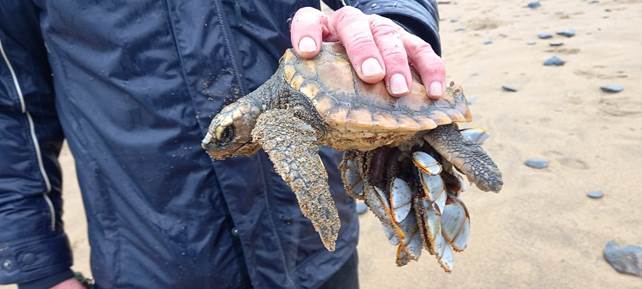
An unusual number of young turtles have been washing up on UK and Irish beaches due to stormy conditions, according to news from the Marine Conservation Society. And their advice is, if you find a turtle, do not return it to the sea – report it.
Since November, a number of turtle strandings have been reported to the Marine Conservation Society, and Marine Environmental Monitoring, which maintains the database of UK and Irish turtle sightings.
In total, thirteen turtles have been reported: twelve loggerheads and one rare Kemp’s ridley turtle, all relatively small juveniles between 20-50cm in shell length. This is an unusually high number.
Most strandings have been in the south-west, with the furthest north being Anglesey. One was also reported on the west coast of Ireland in County Mayo.
Rod Penrose, who leads Marine Environmental Monitoring, said: “Although we see the most hard-shell turtle strandings and sightings between December and February, this year, we’ve had more than usual. They’re mostly juvenile or injured adults, so it’s thought that they struggled to fight the strong winds and currents of severe storms in their native waters of the US and Caribbean, where they were carried offshore into the Atlantic Gyre before ending up in cold UK waters”
Hard-shelled turtles, like loggerheads and Kemp’s ridleys, go into cold water shock in our chilly winter seas and do not survive for long periods in these conditions.
Of the turtles reported this season, four have been rescued and taken to specialist facilities to be rehabilitated and hopefully released in the future. Every effort is made to collect every individual found, so they can either be rehabilitated if alive, or examined, to understand what led to them arriving on UK and Irish shores.
The Marine Conservation Society asks anyone to report jellyfish and turtle sightings as part of its Wildlife Sightings programme.
Amy Pilsbury, Citizen Science Programme Developer at the Marine Conservation Society, said: “It’s important that we gather data on turtle sightings and strandings, as well as other marine life such as jellyfish, to build a picture of our seas. This vital information about our ocean’s inhabitants, and any changes in their frequency and whereabouts, contributes to scientific research which helps us to find solutions to protect our seas.”
What to do if you find a turtle
If you do find a stranded turtle, DO NOT put it back into the sea. It will be in cold shock and will need help. Instead, wrap the turtle in a damp towel and set it on its belly somewhere safe and sheltered, raising its back end slightly to allow any water to drain from its lungs.
Be sure to report the sighting as soon as possible so that the turtle can be taken to a specialist facility where it can hopefully recover or be treated.
For more information on what to do if you spot a turtle, download the Turtle Code.
Report turtle and jellyfish sightings to the Marine Conservation Society at www.mcsuk.org/what-you-can-do/citizen-science/sightings
Header image: Juvenile Loggerhead turtle. Found in Helston, Cornwall. Photo: Mike Pearson
Blogs
Invitation from The Ocean Cleanup for San Francisco port call

6 years ago, The Ocean Cleanup set sail for the Great Pacific Garbage Patch with one goal: to develop the technology to be able to relegate the patch to the history books. On 6 September 2024, The Ocean Cleanup fleet returns to San Francisco bringing with it System 03 to announce the next phase of the cleanup of the Great Pacific Garbage Patch and to offer you a chance to view our cleanup system up-close and personal.
We look forward to seeing you there.
To confirm your presence, please RSVP to press@theoceancleanup.com
PROGRAM
Join The Ocean Cleanup as our two iconic ships and the extraction System 03 return to San Francisco, 6 years and over 100 extractions after we set sail, to create and validate the technology needed to rid the oceans of plastic.
Our founder and CEO, Boyan Slat, will announce the next steps for the cleanup of the Great Pacific Garbage Patch. Giving you a chance to view our cleanup system and the plastic extracted.
Hear important news on what’s next in the mission of The Ocean Cleanup as it seeks to make its mission of ridding the world’s oceans of plastic an achievable and realistic goal.
Interviews and vessel tours are available on request.
PRACTICALITIES
Date: September 6, 2024
Press conference: 12 pm (noon)
Location: The Exploratorium (Google Maps)
Pier 15 (Embarcadero at Green Street), San Francisco, CA
Parking: Visit The Exploratorium’s website for details.
RSVP: press@theoceancleanup.com
Video & photo material from several viewing spots around the bay
We look forward to seeing you there!
ABOUT THE OCEAN CLEANUP
The Ocean Cleanup is an international non-profit that develops and scales technologies to rid the world’s oceans of plastic. They aim to achieve this goal through a dual strategy: intercepting in rivers to stop the flow and cleaning up what has already accumulated in the ocean. For the latter, The Ocean Cleanup develops and deploys large-scale systems to efficiently concentrate the plastic for periodic removal. This plastic is tracked and traced to certify claims of origin when recycling it into new products. To curb the tide via rivers, The Ocean Cleanup has developed Interceptor™ Solutions to halt and extract riverine plastic before it reaches the ocean. As of June 2024, the non-profit has collected over 12 million kilograms (26.4 million pounds) of plastic from aquatic ecosystems around the world. Founded in 2013 by Boyan Slat, The Ocean Cleanup now employs a broadly multi-disciplined team of approximately 140. The foundation is headquartered in Rotterdam, the Netherlands, and opened its first regional office in Kuala Lumpur, Malaysia, in 2023.
Find out more about The Ocean Cleanup at www.theoceancleanup.com.
Marine Life & Conservation
SHARK MONTH ARRIVES AT ROYAL WILLIAM YARD, PLYMOUTH

A shark has been spotted approaching Royal William Yard in Plymouth, much to the surprise of swimmers, paddleboarders and onlookers.
With its distinctive dorsal fin cutting through the water, the sizeable shark swam along the coastline, before turning to head inland towards Firestone Arch at Royal William Yard. The appearance drew a crowd, who were captivated for more than an hour by the unusual sight – and it was all caught on video.
The shark is one of many expected sightings at Royal William Yard over the coming weeks… because today marks the start of Shark Month!
In reality, the ‘shark’ spotted along the Plymouth shoreline was actually a custom-made model, created by the team at Royal William Yard and sailed underwater by Caroline Robertson‑Brown from the Shark Trust, who donned scuba diving gear for the occasion.
The stunt took place to launch Shark Month in style and draw attention to the work of the leading international conservation charity, which is based in Britain’s Ocean City. Spectators were reassured that the water was safe and many entered into the spirit of the performance, swimming or sailing alongside the shark.
Shark Month will take place across Royal William Yard throughout July and will feature an extravaganza of art, entertainment and advocacy for everyone to enjoy. The packed programme of events starts with an art exhibition and ends with a trip on paddleboards with shark experts – with everything from a shark quiz to a Jaws screening in between.
Paul Cox, CEO of the Shark Trust, said: “There are often assumptions and misconceptions when it comes to sharks. This was certainly the case with the shark spotted at Royal William Yard! While the British coastline is home to many species of shark, this was not one of them. However, we’re thrilled it caught people’s attention, because seeing a shark is a special and memorable moment. That is precisely why we want to celebrate these incredible creatures, highlight the need for conservation, and ask for help to safeguard their future.”
For more information about Shark Month at Royal William Yard, visit the Shark Trust Website.
Images and video: Jay Stone
-

 Blogs2 months ago
Blogs2 months agoDiving With… Nico, Ocean Earth Travels, Indonesia
-

 News1 month ago
News1 month agoMurex Bangka Announce New Oceanfront Cottages & Beachfront Dining
-

 Blogs2 months ago
Blogs2 months agoA new idea in freediving from RAID
-

 Marine Life & Conservation1 month ago
Marine Life & Conservation1 month agoIceland issue millionaire whale hunter a licence to murder 128 vulnerable fin whales
-

 Marine Life & Conservation2 months ago
Marine Life & Conservation2 months agoThe Shark Trust Great Shark Snapshot is back
-

 News3 months ago
News3 months agoCharting New Waters; NovoScuba Goes Global with the Launch of their Revolutionary Dive Training Agency!
-

 Gear News1 month ago
Gear News1 month agoNew Suunto Ocean – a dive computer and GPS sports watch in one for adventures below and above the surface
-

 Marine Life & Conservation Blogs2 months ago
Marine Life & Conservation Blogs2 months agoBook Review: Plankton





